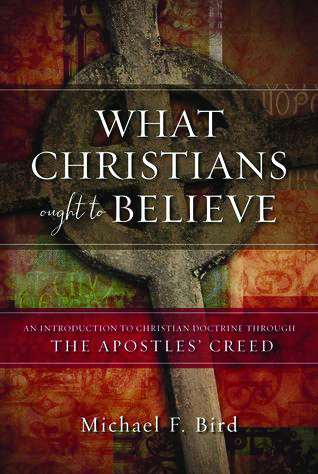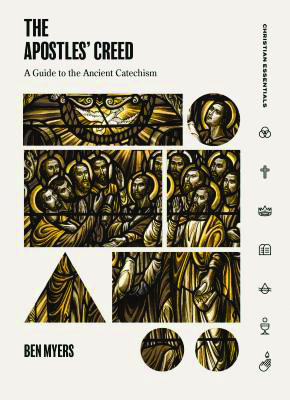The Apostles’ Creed – Christianity’s elevator pitch
This ancient statement of faith is exciting enough to be the subject of two recent books
It’s 1629 years old at least and still useful. It’s the Apostles’ Creed – a short summary of the Christian faith that many reach for when they need a less-than-one-page answer to “what do you believe?” This old statement of faith is exciting enough to be the subject of two recent books by Australian leading theologians – Michael Bird of Ridley College, Melbourne, and Ben Myers of the Millis Institute in Brisbane – and one currently being written by John Dickson of the “Undeceptions” podcast.
It could even be older than we just said. (That age estimate comes from the first time it is mentioned in recorded history.) It is attributed by tradition to the twelve apostles themselves. But the creed is more than very old. It is useful.
“The best thing is that you are confessing a faith that the Christians of western Europe and across the world have declared for nearly 2000 years.” – Mike Bird
“The current climate of the Australian church helps to explain why my friend Michael Bird and I both ended up writing books about the creed around the same time,” Ben Myers tells Eternity. “We noticed that many Christians in Australia have never really been catechised.
‘Catechesis’ is the ancient word for an education in Christian discipleship. It used to be a central activity of every local church. But many believers today have never had the opportunity to come to a mature understanding of their faith.

What Christians Ought to Believe by Michael Bird
“Both books are written to inspire. Mike’s book on the creed, and mine, were partly written for pastors and church leaders.
“We’re hoping they will read these books and will see the richness and vitality of catechesis. If I had my way, I would see every local church transformed into a powerhouse of adult education!”
The creed is also an object of wonder for Mike Bird. “The best thing is that you are confessing a faith that the Christians of western Europe and across the world have declared for nearly 2000 years as a symbol of what it means to believe in Christ and what it means to follow Christ. The Apostles’ Creed is ancient, it’s not a fad, it’s like granite. The creed also transcends denominational differences; it embodies what C.S. Lewis called ‘mere Christianity’ and what Thomas Oden called ‘consensual Christianity.’ The creed declares those elements of the faith that bind all Christians together irrespective of their differences. It is an instrument for unity, oneness, and a shared worship.”
Let’s take one key affirmation in the creed: “I believe … in Jesus Christ … our Lord.”
“The real centrepiece of the Apostles’ Creed is not a doctrine but a name,” writes Myers. “To confess Jesus as Lord is to set him above all other loyalties. It is to make a universal claim. If Jesus truly shares the identity of YHWH, then he is the hidden truth of creation, of history and of every human life (Col 1:15-17). I confess him as my Lord only because I recognise him as the Lord.”
“The real centrepiece of the Apostles’ Creed is not a doctrine but a name.” Ben Myers
Bird explains “the title ‘Lord’ (kyrios) conveys that Jesus carries the weight of divine authority. Kyrios is not a technical title for a deity but simply denotes a person who has authority over someone or something. In the ancient world slaves would refer to their masters as kyrios (Greek) or dominus (Latin). In the gospels when Jesus is addressed as ‘Lord,’ it normally means no more than ‘sir’ or ‘master.’ However there are other occasions where the designation of Jesus as ‘Lord’ is intended to convey Jesus’ divine identity. The resurrection and exaltation of Jesus drove the early church to refer to Jesus as ‘Lord’ in ways identical to how the Old Testament refers to god as YHWH.
“So when Paul says that Jesus is the ‘one Lord’ through whom all things come (1 Cor 8:6) and ‘every tongue [will] acknowledge that Jesus Christ is Lord’ (Phil 2:11), he was using YHWH-language to describe Jesus as the ‘Lord.’ The purpose of this blend of scriptural allusion and devotion to Jesus is to underscore the unequalled status given to Jesus by God the Father.”
“The creed gave us a framework for exploring some of the toughest intellectual challenges that Christians face today.” – Ben Myers
Another stand-out feature of this ancient confession of faith is its real-world impact.
“The ancient institution of slavery didn’t vanish all at once,” Myers writes. “But when slaves and free persons stood side by side and confessed that Jesus is Lord, the days of slavery were numbered.
“When early believers entered the waters and took the name of Jesus on their lips, the tectonic plates shifted. The slow revolution had begun.”
Carefully unpacking each phrase of the creed is what Bird and Myers have done. This reveals the short creed as an extraordinarily powerful text. It’s deep.

The Apostles’ Creed by Ben Myers
It surprised both writers. “Oh yes,” Bird responds, “the line about Christ descending to the dead/hades/hell has created much confusion. Christ did not go to hell, despite what some late Latin versions of the creed say and their Elizabethan English translations. Christ went to hades, the waiting place of the dead, to break the bonds of death. A Byzantine hymn writer, Romanos the Melodist, imagined hades berating the Devil for being so gullible as to be able to think that he could defeat God and keep the Son of God in the clutches of death: ‘Your vaunted cross-tree sends tremors through the universe. The earth is quaking, the sky is black; rocks are splitting, the temple veil is in shreds. Those in the tombs are rising up and corpses shout, ‘Hades, don’t you understand? Adam is beginning his return to Paradise.’”
Myers tells Eternity: “The biggest surprise came when I started teaching a class on the Apostles’ Creed.
“I thought the class would be about Christian history. But it ended up having a strong apologetic focus. We discussed the problem of suffering, God and gender, violence and the atonement, the fragility of creation, the place of the human body in God’s purposes.
“These problems seemed to arise naturally as we worked our way through each line of the creed. So the creed gave us a framework for exploring some of the toughest intellectual challenges that Christians face today. And it gave us a way to relate those challenges to a wider context of God’s purposes for creation. I taught that class for several years and it became a really dynamic dialogue between the ancient faith of the church and the contemporary world. That’s the dynamic that I tried to capture in the book.”
So which bit is Bird’s favourite? “I love the section about the catholic church and the communion of saints. Our faith is not simply assent to belief in God and accepting an offer of salvation from Christ for us as individuals. Faith is about the people created by the gospel of Christ. The church confesses itself in its confession of faith. We are bonded to the Father through Christ and through the Spirit and yet in the same way – even mystically or mysteriously – we are bonded to each other as well. As we grow closer to God, we grow closer to each other.
“If the creed were formulated today I think it would have a lot to say about the soul.” – Mike Bird
“There is then no communion with God without a common union with each other. The church is not a dispensable fashion accessory in my personal and private religion. It is not the throw-away packaging of my Jesus-anity. The church cannot be replaced with an iPad app and some Facebook friends.”
The creed has great resonance with some Christians because it is ancient. But what if it was written today? “The Apostles’ Creed places a huge emphasis on the body,” Myers says.
“God is the creator of material reality; God redeems us by entering creation in a human body; and at the end of the age we will be raised in our bodies to the glory of God. If the creed were formulated today I think it would have a lot to say about the soul. In the time of the ancient church, it was very controversial to affirm the dignity of the body. Today we are faced not only with denials of the goodness of the body but also denials of the soul. There is a huge pressure in our society to live on the surface. The deeper spiritual yearnings of the human person are suppressed and denied. If the creed were written today, it would have included a confession of the human soul and of the way God’s redemptive purposes are aimed at the redemption of the full human person, body and soul.”
Email This Story
Why not send this to a friend?



